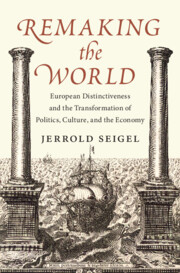 Remaking the World
Remaking the World Book contents
- Remaking the World
- Remaking the World
- Copyright page
- Contents
- Figures
- Acknowledgments
- 1 Introduction
- Part I Liberty and Liberties
- 2 A Preoccupation with Liberty
- 3 From Liberties to Liberty
- 4 Other Liberties
- Part II Autonomy and Teleocracy
- Part III Openness and Domination
- Part IV Making Industry Modern
- Notes
- Index
3 - From Liberties to Liberty
from Part I - Liberty and Liberties
Published online by Cambridge University Press: 29 November 2024
- Remaking the World
- Remaking the World
- Copyright page
- Contents
- Figures
- Acknowledgments
- 1 Introduction
- Part I Liberty and Liberties
- 2 A Preoccupation with Liberty
- 3 From Liberties to Liberty
- 4 Other Liberties
- Part II Autonomy and Teleocracy
- Part III Openness and Domination
- Part IV Making Industry Modern
- Notes
- Index
Summary
By the end of the eighteenth century the plural language of liberty was under widespread attack, denounced by radicals as a denial of innate human rights and a tool of monarchical despotism. This evolution was partly powered by the consolidation of nation-states that picked up speed in the sixteenth century, but this centralization was long incomplete. In this situation the terms “liberties” and “privileges” were almost universally regarded as equivalents, even by so radical a movement as the English Levellers of the seventeenth century. The dissolution of this equivalence took place in France, first as the monarchy’s political and fiscal shenanigans sapped people’s faith in the system, and then as the Revolution mounted a full-scale attack on privilege as a source of inequality and despotism. Supporters of the Revolution followed its lead, but the old language still played a role in Britain and Germany, a reminder that the old language, even with its equivalence of liberties and privileges, long persisted in fostering self-government and resisting oppression.
Keywords
- Type
- Chapter
- Information
- Remaking the WorldEuropean Distinctiveness and the Transformation of Politics, Culture, and the Economy, pp. 39 - 60Publisher: Cambridge University PressPrint publication year: 2024
